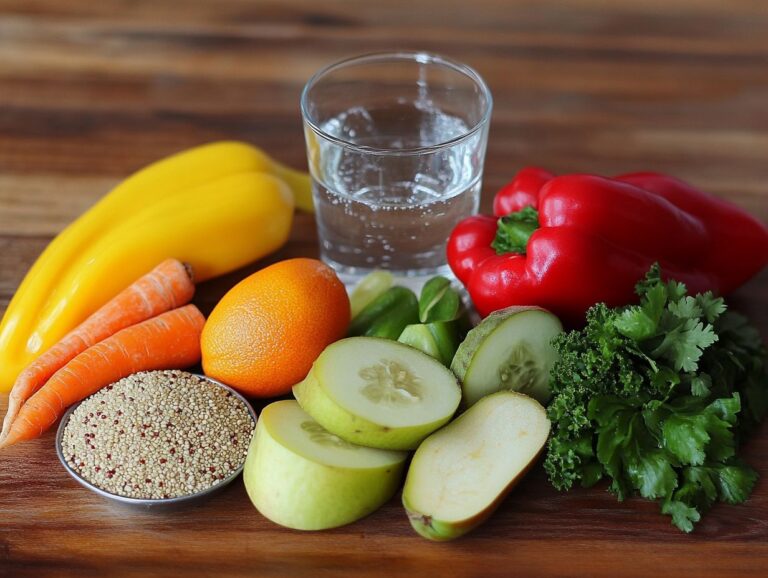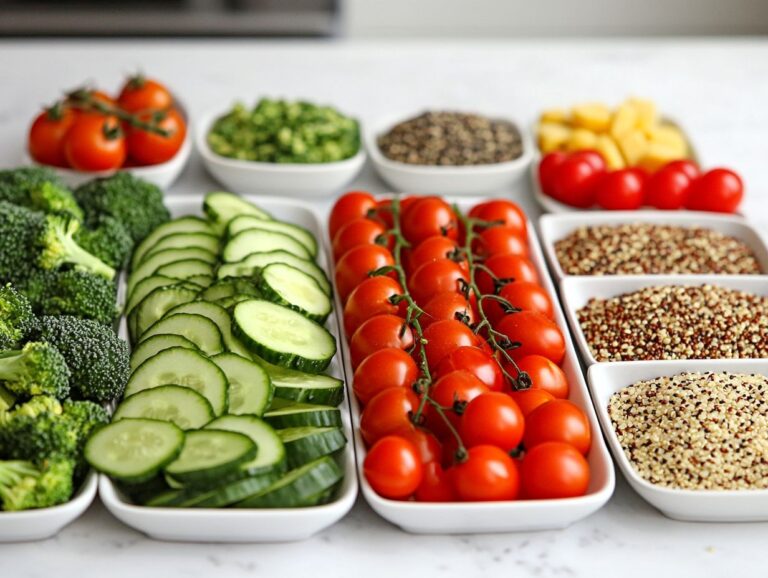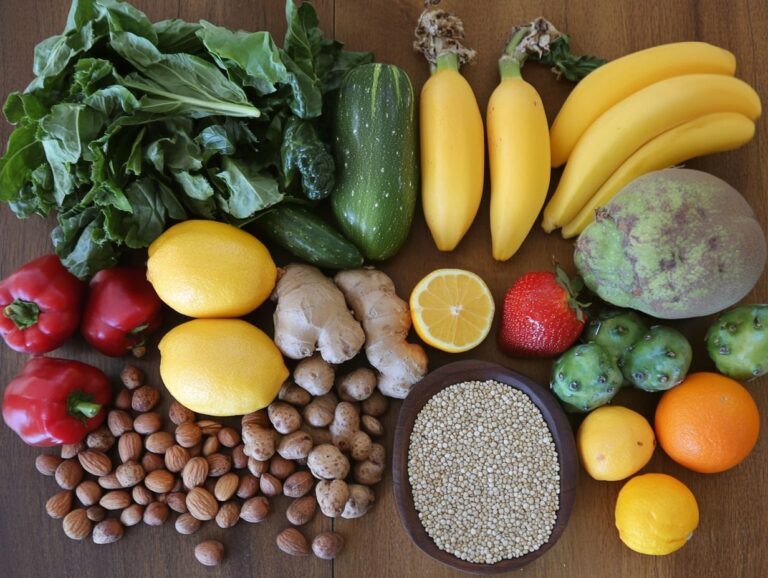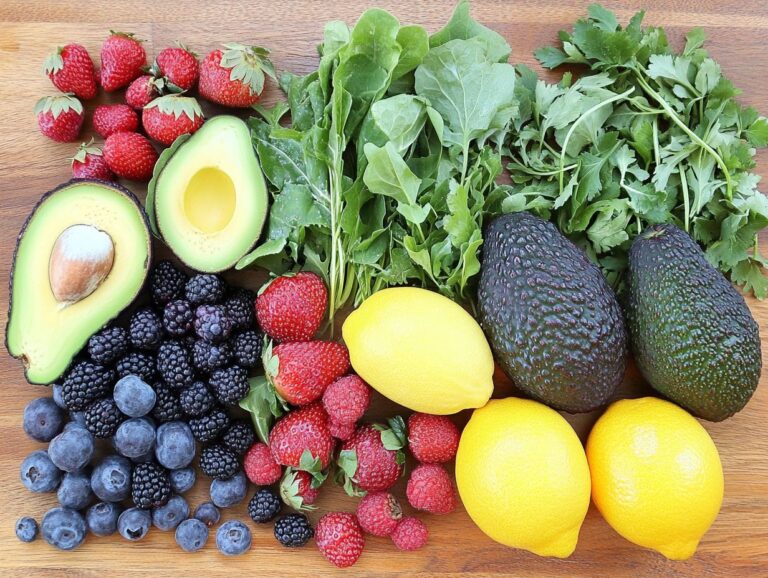A Vegan Reset Diet can help you feel revitalized if you’re experiencing fatigue or a general sense of unease. This dietary approach emphasizes the elimination of animal products while incorporating minimally processed, nutrient-dense foods to improve gut health, boost energy levels, and support weight loss. The following sections will explore the benefits of a Vegan Reset, provide practical tips for implementing a Vegan Reset Diet, and highlight essential foods to include and avoid during this dietary reset.
What is a Vegan Reset Diet?
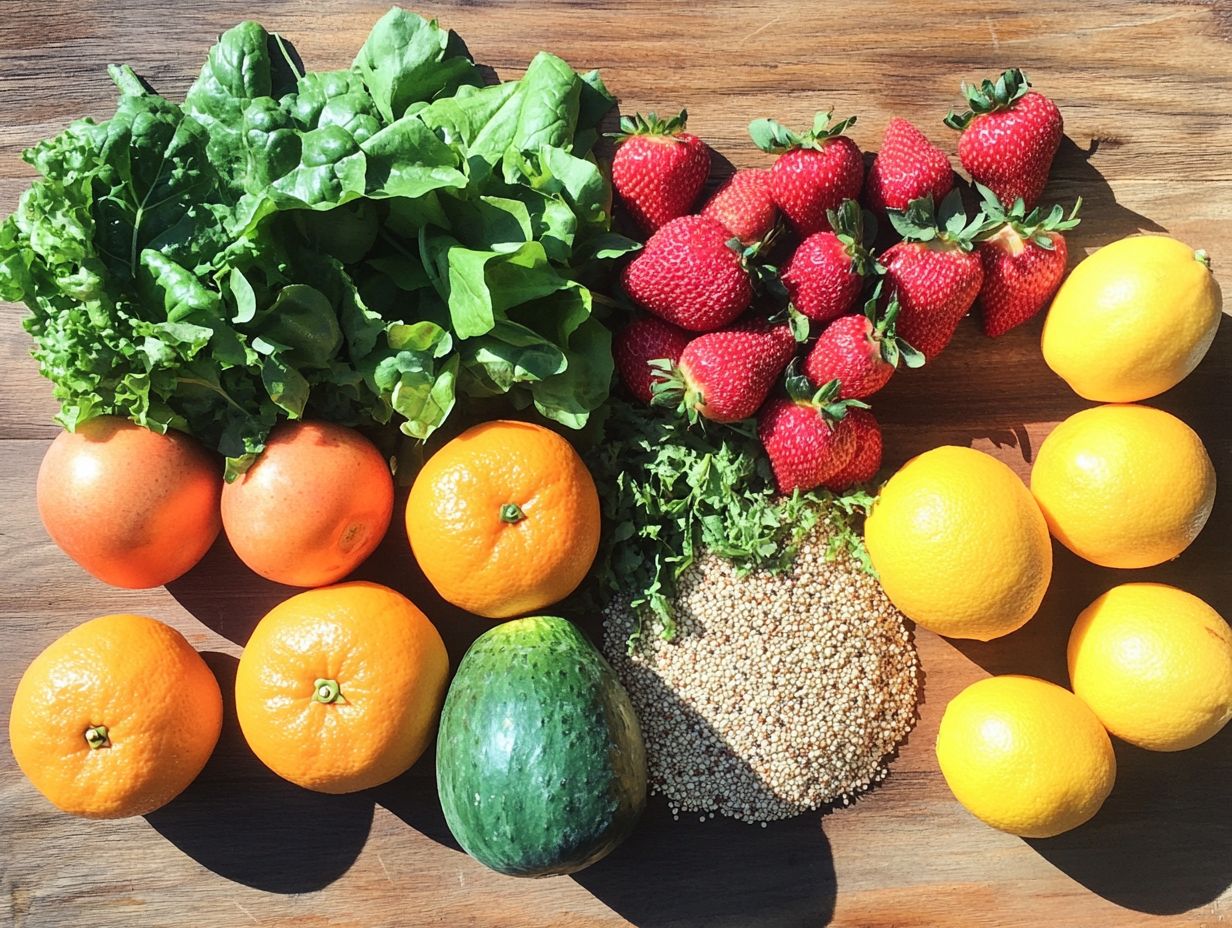
The Vegan Reset Diet is a type of reset diet that focuses on a whole-food, plant-based eating pattern. This structured diet plan is designed to meet individuals’ nutritional needs while promoting lifestyle changes that enhance overall health. It emphasizes a vegan diet, which aligns with dietary guidelines by the U.S. Department of Agriculture and the U.S. Department of Health and Human Services, aiming to provide substantial health benefits.
The Vegan Reset Diet emphasizes the consumption of unprocessed foods, such as fresh fruits, vegetables, and legumes, while eliminating animal products and processed foods. It prioritizes nutrient density and fiber intake to revitalize one’s diet, drawing on the recommendations of registered dietitian nutritionists such as Emily Lachtrupp and Christa Brown, and health organizations like EatingWell to help individuals achieve their health goals.
What Are the Benefits of a Vegan Reset Diet?
The advantages of a Vegan Reset Diet encompass weight loss, improved gut health, increased energy, and reduced inflammation.
By incorporating a diverse array of plant-based foods, such as whole grains, lentils, beans, and seasonal vegetables, individuals can experience significant health improvements, especially when guided by the nutritional expertise of registered dietitians. This approach aligns with healthy habits promoted by the Institute of Integrative Nutrition.
This approach not only aids in weight management but also fosters sustainable healthy habits that contribute to long-term well-being.
1. Improved Gut Health
One of the primary benefits of a Vegan Reset Diet is enhanced gut health, as it includes high amounts of fiber-rich foods such as fruits, vegetables, and legumes, which are essential for the optimal functioning of the digestive system.
A plant-based diet promotes a diverse microbiome, which is crucial for nutrient absorption and overall bodily functions. This high-fiber diet not only aids digestion but also improves gut flora, playing a significant role in maintaining immune functions and protecting against various diseases.
Research has shown that a diverse plant-based diet, featuring a variety of legumes, fruits, and vegetables, fosters a healthy environment for beneficial bacteria to thrive. These microbes ferment fiber to produce short-chain fatty acids, which nourish the gut lining and promote a healthy gut barrier.
Scientific studies indicate that higher fiber intake is associated with lower inflammation, a reduced risk of gastrointestinal disorders, and better metabolic health, demonstrating that such dietary patterns are advantageous for improved gut health.
2. Increased Energy Levels
Adopting a Vegan Reset Diet can significantly boost energy levels. This is primarily because the diet emphasizes nutrient-dense whole foods that provide the essential vitamins and minerals necessary for optimal body function.
By incorporating more plant-based foods into daily meals, individuals can enhance their energy sources and maintain high energy levels throughout the day. Choosing nutrient-rich foods such as:
- Edamame pods, which are rich in protein and amino acids
- Chickpeas, which are high in fiber and complex carbohydrates
can contribute to overall energy management. These foods offer sustained energy and help stabilize blood sugar levels, reducing the afternoon energy dips that many experience. Additionally, they are part of a comprehensive meal plan that incorporates healthy choices and cooking tips for maintaining energy levels.
Additionally, including natural nut butters in the diet adds healthy fats that promote long-lasting energy and satiety. Collectively, these choices help establish healthy habits, enabling individuals to enjoy improved energy, concentration, and overall well-being.
3. Weight Loss
Weight loss is common among individuals who follow a Vegan Reset Diet. This occurs because the diet reduces calorie needs and encourages a shift to unprocessed foods, leading to lower calorie intake while still maintaining food volume and fiber. It also emphasizes the inclusion of satisfying meals, which are crucial for successful weight management.
This dietary transition not only promotes weight loss but also helps individuals develop healthy habits through meal preparation and regular meal scheduling.
By incorporating whole plant-based ingredients, many people can enjoy satisfying meals without the added sugars and unhealthy fats found in processed foods, which supports healthy weight loss and fosters a more mindful relationship with food.
Testimonials from those who have adopted this lifestyle frequently highlight the benefits of meal prep, as it allows for healthy options to be readily available, making it easier to avoid unhealthy choices.
Scientific studies support this approach, showing that diets rich in whole foods significantly contribute to feelings of fullness and satiety.
4. Reduced Inflammation
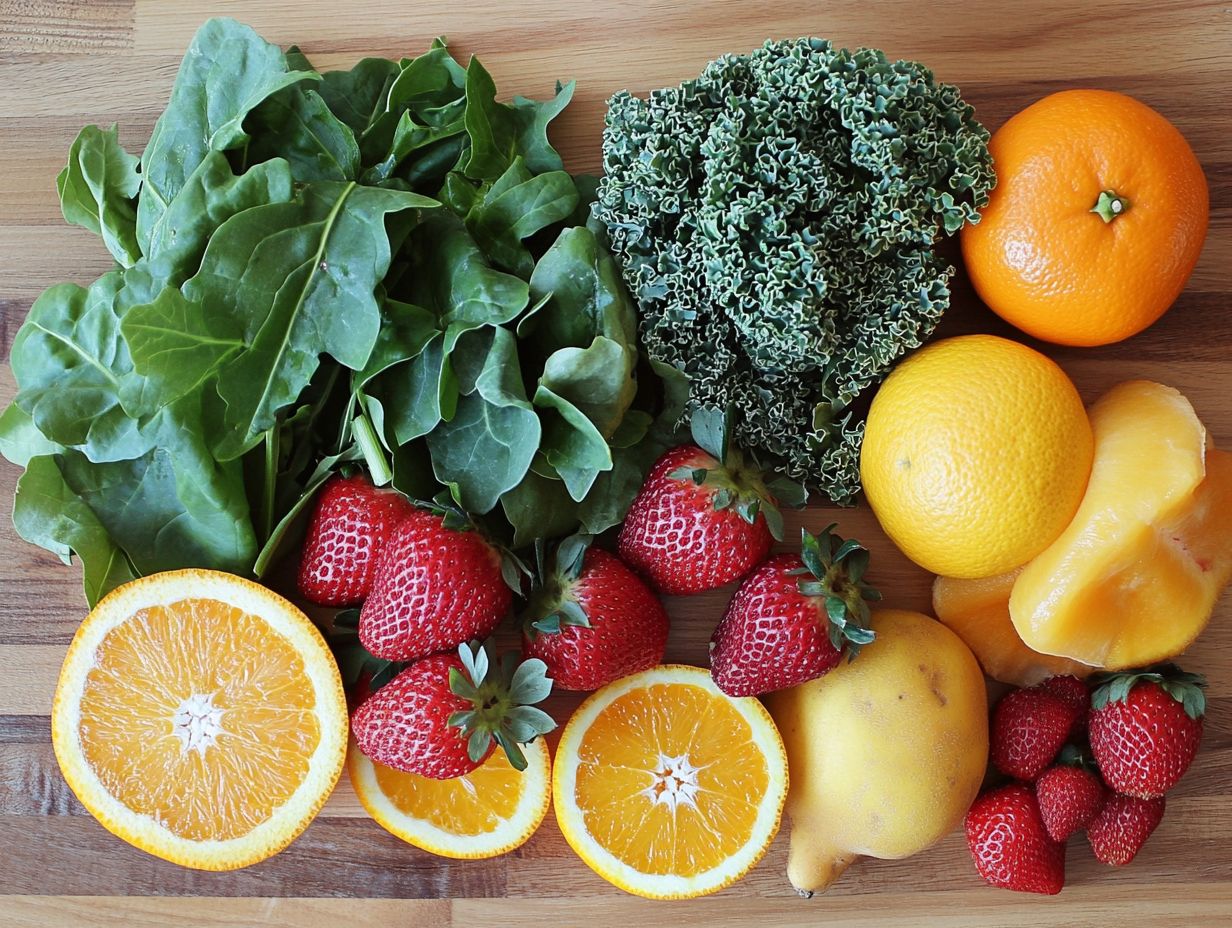
The Vegan Reset Diet helps reduce inflammation by emphasizing a high intake of fruits, vegetables, and legumes that are rich in antioxidants, which in turn lowers oxidative stress and inflammation. This diet eliminates processed foods, allowing individuals to consume more nutrient-dense, whole food sources, potentially leading to fewer symptoms of chronic inflammatory diseases. It strongly encourages the inclusion of specific foods known for their anti-inflammatory properties.
For example, berry consumption, including blueberries, strawberries, and raspberries, is beneficial due to their high antioxidant content, particularly flavonoids, which can reduce markers of inflammation. Leafy green vegetables like spinach and kale are also recommended, as they are rich in vitamins, minerals, and phytonutrients that possess anti-inflammatory effects. Additionally, nuts such as walnuts and almonds are known for their anti-inflammatory benefits due to their high levels of healthy fats and omega-3 fatty acids.
By following these dietary recommendations that include nutrient-dense foods, individuals can improve their overall health while fostering balanced eating patterns that protect against many chronic diseases.
How to Do a Vegan Reset Diet?
A Vegan Reset Diet involves eliminating all animal products and prioritizing whole foods as the main source of nutrition. It also recommends using dairy substitutes to meet calcium and vitamin D needs without animal products.
To successfully follow a Vegan Reset Diet, it is essential to engage in meal planning and prepare dishes that feature plant-based ingredients.
Additionally, you should ensure that you meet your dietary needs by incorporating a variety of food sources.
1. Eliminate All Animal Products
The first step in a Vegan Reset Diet is to eliminate all animal products, including meat, dairy, and eggs, in alignment with the principles of a vegan diet and health advisories promoting plant-based nutrition. Nutritional counseling is often beneficial to ensure that all essential nutrients are still being consumed.
This dietary change can be particularly important for individuals looking to improve their overall health while reducing their ecological footprints. Plant-based sources such as legumes, nuts, seeds, and whole grains provide protein along with a variety of vitamins, minerals, and fibers that support various bodily functions. This helps reduce the risk of chronic illnesses, such as heart disease and type 2 diabetes, which are often associated with high consumption of animal products.
Incorporating a wide array of colorful fruits and vegetables allows individuals to meet their recommended intake of antioxidants, which are vital for counteracting oxidative stress and inflammation.
To ensure nutritional adequacy, it is important to account for nutrients such as vitamin B12, iron, and omega-3 fatty acids, which may need to be supplemented in a well-planned vegan diet.
2. Focus on Whole Foods
Whole foods are essential to a Vegan Reset Diet due to their nutrient density and numerous health benefits, including improved fiber intake and enhanced energy levels. Community Supported Agriculture (CSA) programs can be a valuable resource for sourcing fresh vegetables and fruits.
A well-rounded food list should include:
- Fresh vegetables and fruits
- Legumes
- High-protein options such as lentils and chickpeas
Additionally, incorporating a variety of whole grains like quinoa, brown rice, and oats is beneficial, as they are excellent sources of complex carbohydrates. Nuts and seeds should be prioritized for their healthy fats and protein content, making them ideal snacks or meal additions.
Focusing on diversity within the diet not only makes meals more enjoyable but also ensures that a full range of vitamins and minerals is consumed, positively impacting overall health. This approach facilitates a balanced intake of macronutrients, promoting a positive and healthy experience on a plant-based journey.
3. Plan Your Meals
Meal planning is one of the most important aspects of a Vegan Reset Diet. Having a variety of vegan recipes planned and ready to go is crucial for maintaining positive momentum toward adopting healthier habits and routines that extend beyond your usual cooking regimen. This includes using meal prep strategies to ensure simple meals are readily available, which aids in diabetes management and maintaining healthy habits.
Vegan meal planning is beneficial for achieving nutritional balance, as it ensures that meals are nutritionally adequate. By planning meals in advance, you can also avoid cravings for less healthy processed foods.
To maximize the benefits of meal preparation, consider batch cooking—preparing larger portions of a dish ahead of time and dividing them throughout the week. This approach not only saves time but also reduces the temptation to opt for unhealthy options on days when cooking time is limited.
Storing prepared meals in clear, labeled containers makes them easily accessible and encourages mindful eating. Incorporating seasonal produce into your meal prep can enhance both flavor and nutrient density while helping you stay within budget. Engaging in meal prepping also ensures your calorie needs are met while fostering healthy habits.
By integrating these practices, a vegan diet can become one of the most sustainable lifestyles, making it easier and more enjoyable to adhere to a healthy eating plan. Meal planning with a registered dietitian can help meet your nutritional needs and provide health benefits.
What Foods Should You Eat on a Vegan Reset Diet?

On a Vegan Reset Diet, it is essential to consume a variety of foods, including fresh fruits, vegetables, whole grains, legumes, nuts, and seeds.
This approach ensures a nutrient-dense and satisfying diet that meets all dietary requirements. By including diverse options such as whole grains, legumes, and fresh vegetables, you can enjoy flavorful meals while fulfilling important nutritional needs.
1. Fruits and Vegetables
Fruits and vegetables are essential components of a Vegan Reset Diet, providing vital vitamins, minerals, and fiber that promote overall health and enhance nutrient density.
Consuming seasonal produce not only boosts flavor but also ensures that you are enjoying the freshest fruits and vegetables available. A diverse array of fruits and vegetables contributes significantly to optimal health.
Dark leafy greens, such as kale and spinach, are excellent sources of micronutrients like iron and calcium. Meanwhile, brightly colored fruits like oranges and berries are rich in antioxidants that help boost immunity. Including seasonal plants like edamame pods and other plant-based foods can further enhance your diet.
Seasonal offerings, such as crunchy fall apples and ripe summer tomatoes, are not only delicious but also healthier due to their freshness, which results in better nutrient retention. By incorporating a wide variety of colors and types of produce into your diet, you can enjoy numerous health benefits, including improved digestion, a lower risk of chronic diseases, and sustainable eating practices. Community Supported Agriculture programs can provide access to the freshest fruits and vegetables.
2. Whole Grains
Whole grains are a vital component of a Vegan Reset Diet, serving as a source of complex carbohydrates that provide energy, fiber, B vitamins, and other essential nutrients that promote digestive health and overall well-being.
Incorporating whole grains such as oats, quinoa, and brown rice can enhance satiety and offer a variety of health benefits. These grains are rich in fiber, which aids in digestion and helps maintain a healthy weight. Following dietary guidelines from the U.S. Department of Agriculture ensures you get a balanced intake of fiber and protein.
Additionally, whole grains contain various vitamins and minerals. For instance, quinoa is a complete protein that includes all nine essential amino acids, making it an excellent substitute for animal products. Engaging in meal planning tips from experts such as those at the Institute of Integrative Nutrition can help you incorporate these foods seamlessly into your diet.
Adding whole grains to salads, soups, or breakfast bowls creates nutritious meals that support heart health and stable blood sugar levels. Chia seeds and whole grain wraps can also be enjoyable additions that further diversify a plant-based diet while ensuring the regular intake of essential nutrients. Cooking meals with these ingredients can provide satisfying meals that adhere to eating guidelines.
3. Legumes
Legumes, such as lentils, beans, and chickpeas, are concentrated sources of protein and fiber that promote satiety and nutritional balance in a Vegan Reset Diet. They are versatile ingredients that can be incorporated into a variety of satisfying meals, enabling individuals to meet their protein needs without relying on animal products. Including lentils beans in your diet helps enhance your fiber intake and supports a high-protein lifestyle.
Rich in iron, magnesium, and other essential micronutrients, legumes play a vital role in supporting overall health. Incorporating legumes into your daily diet can be as simple as adding chickpeas to a green salad or blending lentils into soups and stews, which not only boosts protein intake but also increases fiber intake, promoting healthy digestion. Consulting with a registered dietitian for nutrition education can help you maximize the benefits of these foods.
For a more exciting meal option, you can create a spicy black bean burger or wrap lentils in a warm tortilla with vegetables. The possibilities are endless!
4. Nuts and Seeds
Nuts and seeds are rich in healthy fats and proteins, making them an essential component of a Vegan Reset Diet. They can be enjoyed whole, incorporated into other foods to enhance taste and texture, or transformed into natural nut butters, providing a nutrient-dense choice that supports overall health.
A variety of nuts, such as almonds, walnuts, and cashews, can be combined with seeds like chia, flax, and pumpkin to offer a diverse array of nutrients. For example, walnuts are high in omega-3 fatty acids, which help improve heart health, while chia seeds are packed with fiber and antioxidants. Natural nut butters made from these nuts can also provide a nutrient-dense choice for your meals.
These plant-based protein sources can easily be added to smoothies, salads, or used as toppings for oatmeal. Baking or spreading foods with nut butters not only enhances the nutritional profile but also ensures that meals are both satisfying and beneficial for health and wellness.
What Foods Should You Avoid on a Vegan Reset Diet?
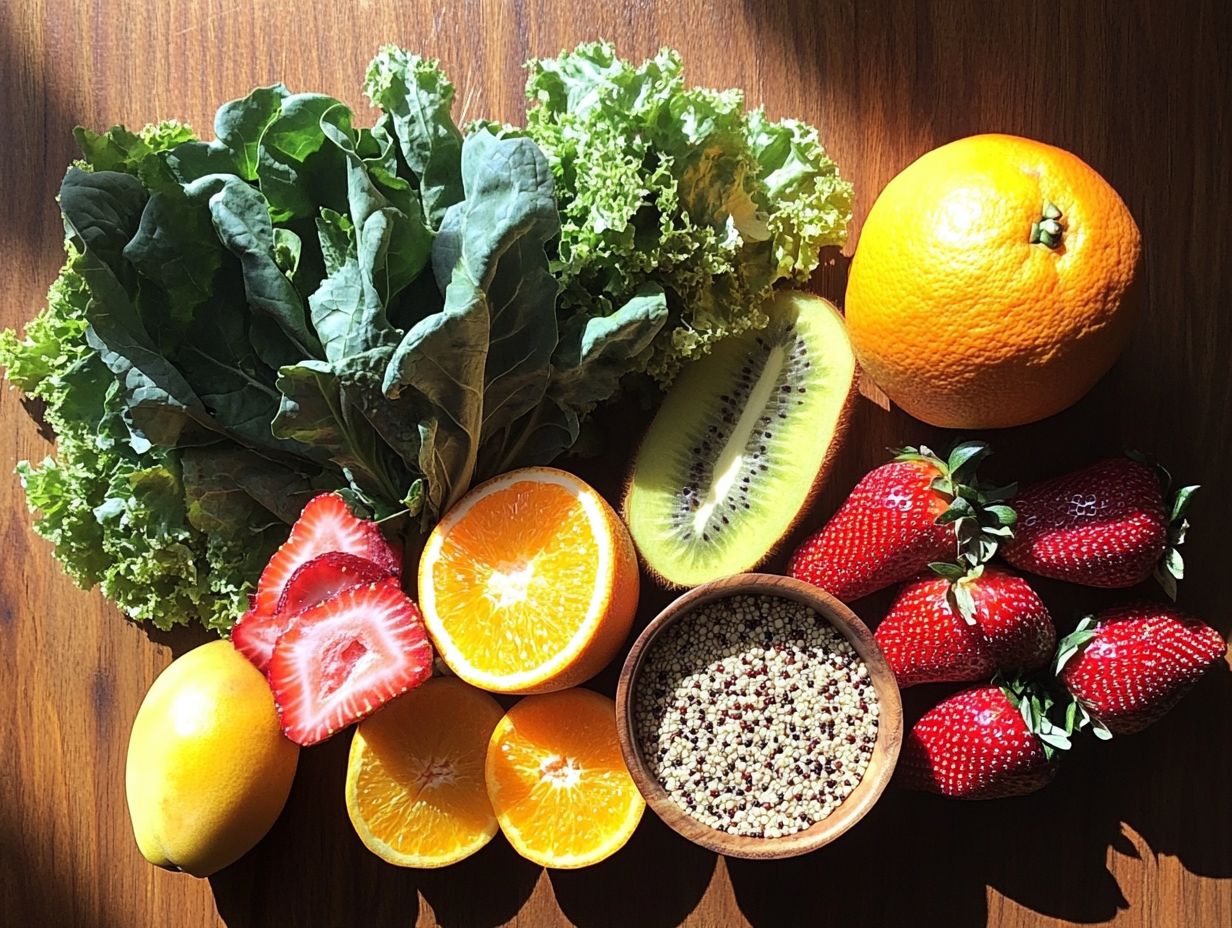
The Vegan Reset Diet prohibits all animal products, processed foods, added sugars, and alcohol. These foods are excluded from the diet because they do not support health goals; instead, the focus is on consuming whole, nutrient-dense foods. Following dietary guidelines from the U.S. Department of Health and Human Services can help ensure you meet your nutritional needs while avoiding these substances.
1. Animal Products
During a Vegan Reset Diet, animal products such as meat, dairy, and eggs are prohibited, as they contradict the fundamental principles of plant-based eating and the health guidelines set forth by the World Health Organization, which advocate for a vegan diet.
It is essential for those transitioning to this lifestyle to replace dairy with plant-based alternatives, such as dairy substitutes. The exclusion of animal products from the diet is driven not only by dietary preferences but also by significant health implications and ethical considerations. Consulting with experts like Emily Lachtrupp and Christa Brown can provide additional insights into making this transition smoothly.
Research indicates that the consumption of animal products can elevate the risk of chronic diseases, including cardiovascular disease, diabetes, and certain types of cancer. Ethically, many individuals choose a vegan lifestyle to stand against animal cruelty and the environmental harm associated with factory farming, and fortunately, there are numerous alternatives available.
For instance, almond or oat milk can serve as substitutes for cow’s milk, while tofu or tempeh can replace meat. These choices not only promote personal health but also reflect a commitment to a compassionate way of living.
2. Processed Foods
Processed foods are a significant category to avoid on a Vegan Reset Diet, as they tend to be high in unhealthy fats, sugars, and additives that do not fulfill your nutritional needs. By focusing on whole, unprocessed foods, individuals can make healthier choices that support their overall health goals. Engaging in nutritional counseling can aid in understanding the importance of unprocessed foods and making healthy choices.
This is particularly crucial because reliance on processed items, such as frozen meals, snacks, and sugary drinks, can lead to weight gain, decreased energy levels, and an increased risk of chronic diseases.
For instance, many plant-based convenience foods may seem healthy but often contain excessive levels of sodium, preservatives, and sweeteners that can negate the benefits of a reset. Instead, choosing fresh fruits, vegetables, whole grains, and legumes can provide essential nutrients and promote better well-being.
Preparing meals from scratch not only enhances flavor but also ensures a balanced diet rich in vitamins and minerals, built upon whole-food choices.
3. Added Sugars
In a Vegan Reset Diet, it is essential to avoid added sugars, as they offer little nutritional value and can contribute to weight gain and various health issues. Being aware of the sources of added sugars is crucial for maintaining a healthy diet and adhering to the guidelines associated with plant-based eating.
Excessive consumption of added sugars can lead to obesity, insulin resistance, and the development of chronic diseases such as diabetes and heart disease. Added sugars are defined as sugars or caloric sweeteners that are incorporated during food processing and are often considered “hidden” sugars. Understanding the sources of added sugars can be essential for diabetes management and overall health.
Common examples of added sugars include:
- sucrose
- high fructose corn syrup
- honey
- fruit juice concentrates
These sugars are frequently found in processed foods, beverages, and other unexpected sources. Common sources of added sugars include:
- soda
- energy drinks
- salad dressings
- sauces
- flavored yogurt
- granola bars
- baked goods
To effectively reduce added sugars, it is important to read nutrition labels and select foods without added sugars, as well as to focus on whole foods such as fruits, vegetables, and grains. Incorporating small amounts of natural sweeteners like maple syrup or dates can provide sweetness to dishes without introducing the same health risks associated with refined sugars.
4. Alcohol
Alcohol is the third substance to eliminate on a Vegan Reset Diet, as it can hinder weight loss and adversely affect gut health, undermining the diet’s health benefits. Ceasing alcohol consumption can foster a significant lifestyle change that aligns with the goals of the Vegan Reset Diet.
Ceasing alcohol consumption can foster a significant lifestyle change that aligns with the goals of the Vegan Reset Diet. This is largely due to the fact that alcohol can cause inflammation, disrupt digestion, and impair the body’s ability to absorb essential nutrients necessary for a vegan diet.
For those committed to a Vegan Reset, it is crucial to recognize how alcohol can impede overall wellness and vitality. Choosing alternatives such as sparkling water with fruit or herbal teas allows individuals to enjoy the social aspects of drinking without compromising their health goals during social gatherings. Engaging in cooking tips and creating vegan recipes can further align with your health goals.
Additionally, seeking social environments that promote healthy choices is essential for maintaining good habits, as it enables individuals to have fun while supporting their vegan lifestyle.
